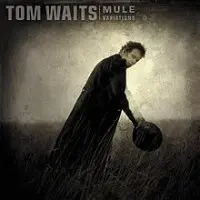Tom Waits is the best living American songwriter. He’s proved over four decades, starting with 1973’s Closing Time through 2013’s Bad as Me, that it’s hard for him to do much wrong. The reason for this: Tom Waits has never been traditional. While his first few albums can be considered standard boozy storytelling, 1983’s Swordfishtrombones changed all that. There Waits entered the second, strangest chapter of his career. Between that and Rain Dogs, Waits redefined his image. The storytelling remained impeccable, but the music was new and exciting. And, realistically, difficult for the average listener.
Mule Variations was the start to the third chapter of Waits’ career. After a six-year break, Waits released this new record on Epitaph offshoot ANTI- where he’s been ever since. By this point Waits had established himself as a wild card. So, what he did was make an album that encompassed everything he’d done up to that point: a little for everyone, mostly for himself. “Big in Japan” started things off with classic oddball Waits. The song, about musicians who lack presence in US markets but are gigantic in Japan, was wild with banging pots and pans and an indication that anyone looking for traditional rock or folk music should look elsewhere. “What’s He Building?” was another curveball, more spoken word than rock and roll, but it drew your attention immediately. “Filipino Box Spring Hog” was aggressive with percussion abound, discussing cooking pig on a mattress over a hole in the ground. Yeah. Only Tom Waits.
Then there were the ballads. As great as Waits was when he got wild, his ballads highlighted the songwriting beneath the cacophony. “Hold On” was stunning, beautifully written with his wife Kathleen Brennan, as many of the songs were. It was the most traditional song on Mule Variations, which in turn, made sense that it garnered him a Grammy nomination for Best Male Rock Vocal Performance. (The album itself won the Grammy for Best Contemporary Folk Album, again defying classification.) “Chocolate Jesus,” another slowed down song featuring banjo and roosters, acted in stark contrast to straightforward nature of “Hold On.” “Georgia Lee,” a ballad to a slain girl, where Waits point blank asked, “Why wasn’t God watching? Why wasn’t God listening? Why wasn’t God there for Georgia Lee?” told the true story of a murdered young victim through Waits’ uneasy deliver. Then the penultimate, sweet “Take It with Me” proved once again how effective Waits could be with just a piano and his raspy voice.
Mule Variations was strange because it seemed to be a divisive release from Tom Waits. While generally well-received, many claimed this showed an aging Waits that would never make another Rain Dogs. But really if Mule Variations proved one thing, it was that no one could make an album quite like Tom Waits and he still had plenty left to say.
